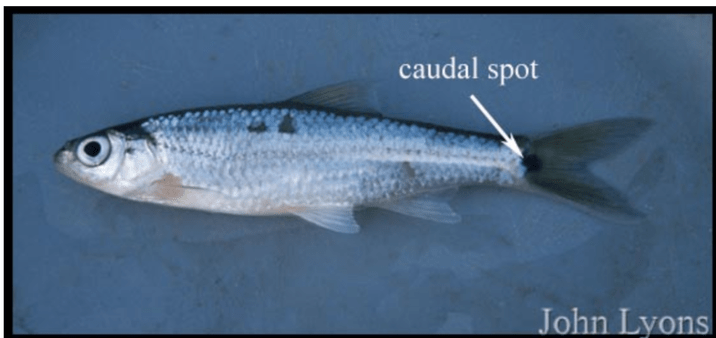Key Characteristics:
- Most have a lateral stripe. Single dorsal fin. Pigment on top of the head.
- Dorsal fin begins after the start of pelvic fin in some species (emerald and golden shiners).
- Very hard to key out to species except for a few unique species until about 20 mm.
- Most pre-anal myomeres than post. But the ratio is more even than for Clupeidae and Catostomidae.
- “Lumpy” head.

Larval Spottail Shiner. 24 mm. United States Fish & Wildlife Service. Green Bay, Lake Michigan, WI. Adam Dziewa. 2017

Spottail Shiner Larvae. United States Fish & Wildlife Service. Marian Shaffer. 2017.

Spottail Shiner Larvae. United States Fish & Wildlife Service. Marian Shaffer. 2017.

Spottail Shiner Larvae. United States Fish & Wildlife Service. Marian Shaffer. 2017.

Larval Spottail Shiner. 25 mm. United States Fish & Wildlife Service. Green Bay, Lake Michigan, WI. Adam Dziewa. 2017
- Body not elongated, eel-shaped, round in transverse section, uniformly pigmented (1B)
- Chin barbels absent (3B)
- Snout short, its length usually less than 10% TL; median fins otherwise (5B)
- Median fins or finfolds showing distinct separation (7B)
- No adipose fin, or demarcation of one, in finfold (10B)
- Preanal myomeres greater than or equal to postanal myomeres (14A)
- Preanal myomeres significantly greater than postanal myomeres (difference greater than five myomeres) (15B)
- Postanal myomeres greater than 10 (26B)
- Preanal myomeres usually less than 30 (28A)
- Cyprinidae (Carps + Minnows)
Adult History
- Physical Description
- Short & rounded snout, subterminal mouth, large black caudal spot (base of tail), compressed body, 8 anal and single dorsal rays, no barbels, light green back with a white belly, well developed pharyngeal teeth, and little to no pigment by the dorsal fin
- Spawning Habitat
- Shallow/inshore waters (streams)
- Mouths/channels of small tributaries
- Spawning Substrate
- Gravel, channels, or sandy shoals
- Spawning Behavior
- Broadcast Spawners (no parental care)
- Time of Year
- June to July in Lake Michigan
- Spawning typically takes place at water temperatures of 60-70°F
- Diet
- Omnivores
- Aquatic insect larvae, algae, plankton, or any other eggs/larvae
- Omnivores

